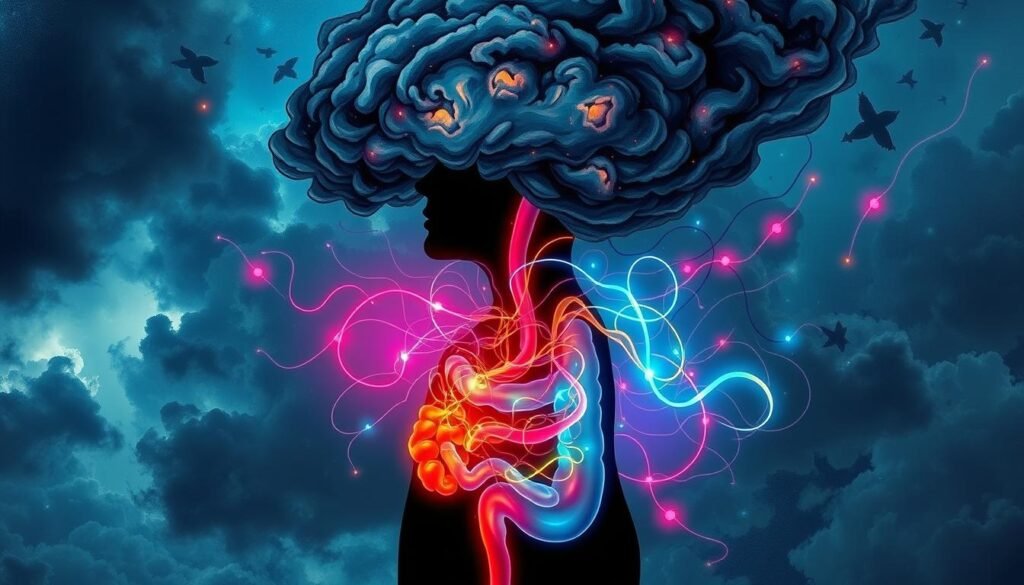Did you know anxiety affects about 40 million adults in the U.S. each year? This big number shows a serious issue that’s not just about feeling stressed. Anxiety can really upset your stomach, making many people suffer from gut problems.
Anxiety changes how your body works, hitting your gut hard. People with ongoing worry may face stomach pain, feeling sick, diarrhea, and not wanting to eat. By seeing how stress messes with your gut, you can spot the link between your mind and digestive health. To learn more about anxiety’s physical signs, visit this source.
The link between stress and your stomach is strong. Issues like Irritable Bowel Syndrome (IBS) are often tied to anxiety. Knowing this link is key to feeling better, both mentally and in your gut.
Key Takeaways
- Anxiety disorders impact millions, resulting in various physical symptoms, including digestive issues.
- The connection between mental health and gastrointestinal health is crucial for managing symptoms effectively.
- Chronic anxiety can lead to long-term digestive conditions like Irritable Bowel Syndrome (IBS).
- A comprehensive approach that addresses both anxiety and digestive health is essential for overall well-being.
- Recognizing the signs of how anxiety affects the digestive system can help individuals seek appropriate care.
Understanding the Gut-Brain Connection
The gut-brain connection is a complex interaction between our digestive system and brain, influencing health. This link is largely through the enteric nervous system, with over 500 million neurons. It’s the most detailed neural network outside the brain. These neurons talk to the brain non-stop. They show how the mind and body are connected.
Our emotions greatly affect how our digestive system works. The gut has nerve cells that stress and anxiety can hit, showing the gut-brain link’s value. Studies tell us that 30% to 40% of people might have gut issues. Many people with irritable bowel syndrome (IBS) also have anxiety or depression. This shows how our feelings can mess with gut health.
Research is looking into how the gut might influence our thinking and memory. The vagus nerve is key in linking the gut and brain. Also, scientists are checking out how probiotics could help our gut health and mood.
There’s a growing interest in how the gut microbiome affects our brain and mental health. The balance of gut bacteria can change our mood and gut health. As more is discovered, it’s clear that a healthy gut is vital for our overall health.
How Anxiety Affects the Digestive System
Anxiety sets off many reactions in our body, which can mess up our digestion. Our gut is like a “second brain” because it has so many nerves. It responds to stress by changing how it works. This can lead to problems like stomach pain or trouble digesting food.
The Role of Nerves in Digestive Function
Nerves are crucial for digestion. When we’re anxious, our body’s stress response can slow down digestion. This means resources go to “fight or flight” needs instead. Because of this, we might get stomach aches, acid reflux, or constipation. Stress can even cause diarrhea, not just as a one-time thing but as a repeated problem.
Long-term stress makes these issues worse, leading to ongoing digestive troubles.
Shared Nerve Connections: Brain and Gut
The brain and gut share many nerve connections. So, our emotions can directly affect our stomach. Thinking negatively about stress can make gut problems more severe. Constantly being stressed can bring on issues like bloating, cramping, and ulcers.
To handle this, trying relaxation or breathing exercises can help. Writing down what you eat and how you feel can pinpoint what makes things worse. It’s also good to talk to a doctor. They can offer advice on things like fiber supplements or probiotics to improve digestion. For more info, check out studies on stress and the gut at https://pubmed.ncbi.nlm.nih.gov/22314561/.
The Physical Symptoms of Anxiety on Digestion
People with high anxiety often feel it in their digestion. Stress and gut health are closely linked, affecting each other deeply.
Common Gastrointestinal Symptoms
Anxiety makes many gut problems worse, such as:
- Indigestion
- Loss of appetite
- Bloating
- Diarrhea
- Constipation
These issues can keep going or get worse with stress. For instance, long-term anxiety might cause frequent upset stomach or bloating.
Link Between Stress Hormones and Gut Health
Cortisol, a stress hormone, is key in gut health. It can cause inflammation in the digestive tract. This may harm the good bacteria in the gut, especially during stress.
Trying relaxation methods can help manage this. Things like self-care, support from friends, and focusing on mental health can improve gut health.
| Gastrointestinal Symptoms | Impact of Anxiety |
|---|---|
| Indigestion | Triggered by stress, leading to discomfort and bloating. |
| Loss of Appetite | Common in those experiencing anxiety, often impacting nutrition. |
| Bloating | May occur due to stress-induced changes in digestive speed. |
| Diarrhea | Can result from stress, prompting urgent bowel movements. |
| Constipation | Chronic anxiety might lead to slower gut transit time. |
Irritable Bowel Syndrome: A Common Result of Anxiety
Irritable Bowel Syndrome (IBS) is a common condition that involves the gut and is linked to anxiety. It leads to stomach pain, bloating, and changes in bowel habits. This issue is found mostly in people younger than 50, affecting more women than men in the U.S. Studies show that around 60% of those with IBS also face mental health problems.
Defining Irritable Bowel Syndrome (IBS)
IBS is known for causing long-term stomach issues without any visible damage to the gut. Those dealing with it face a range of symptoms that make daily activities hard. Interestingly, IBS doesn’t increase cancer risk in the colon. But, it can badly affect life quality, causing people to miss work often. Managing IBS well over time is crucial for those affected.
How Stress Contributes to IBS Symptoms
Stress significantly worsens IBS symptoms. More than half of IBS sufferers with a mental condition also have anxiety. Some may need psychological support if their case is severe. Treatments like diet changes and medicines help two-thirds get better. For intense symptoms, therapy and counseling are beneficial.

| Statistic | Figure |
|---|---|
| Patients with IBS meeting psychiatric disorder criteria | 60% |
| IBS patients with generalized anxiety disorder | Over 60% |
| IBS patients benefiting from diet/medication changes | Two-thirds |
| Severe IBS symptoms benefiting from psychological help | One-third |
| IBS more common in women | Yes |
The Impact of Stress on Gut Flora
The gut microbiome is key to our well-being. It affects digestion and how our immune system works. Stress can harm this balance, leading to health problems. Knowing how stress affects gut flora is a step towards better mental health.
The Importance of the Gut Microbiome
A balanced gut helps with digestion, energy, and even mood. It’s full of helpful microorganisms. But stress can mess up this balance. It increases bad bacteria and decreases good ones. This can lead to stomach issues like IBS or IBD, which disrupt digestion.
Imbalance Induced by Anxiety and Stress
Stress-related lifestyle changes can hurt gut health. Moving to a new place, for instance, can stress the gut. Also, a bad diet affects the gut’s balance. Eating more fiber and fermented foods like yogurt helps. Meditation and a healthy diet are key for a happy gut.
Stress and Digestion: The Fight or Flight Response
Stress can have a big impact on your digestion. When stressed, the brain tells the body to get ready to either fight or run away. This fight or flight response can mess with your digestive system. As a result, people might feel stomach pain, bloated, or not hungry. Knowing how stress and digestion are related is key to better digestive health.
Understanding the Body’s Stress Response
The digestive system is complex and works with many neurotransmitters. It’s often called the second brain because it has around 90% of the body’s serotonin within the enteric nervous system (ENS). Stress can stop the digestive system from working right. This can make symptoms worse for those with digestive issues like IBS and functional dyspepsia.
Consequences of Prolonged Stress on Digestion
Stress over a long time can throw off your digestive health. You might get stomach aches, gas, bloating, heartburn, nausea, and diarrhea because of it. Research shows a link between how bad functional gastrointestinal disorders (FGIDs) are and healthcare use and life quality. Mindfulness can help manage these symptoms and improve digestion.
Practices like deep breathing, body scans, and eating mindfully can help those with stress-related digestive problems. For more help with stress, check out anxiety management techniques. They can be useful in reducing symptoms like shaking.
Coping Strategies for Managing Stress and Anxiety
Effectively managing stress and anxiety is key for good digestive health. Adding coping strategies can lessen anxiety and its effects on your gut. These methods help relax you and boost your overall health.
Breathing Techniques to Calm the Stomach
Breathing exercises are easy and powerful. They calm both your mind and stomach. By taking deep, rhythmic breaths, you can make your body relax. This eases tension in the digestive system.
Diaphragmatic breathing is one simple exercise. You breathe in deeply through your nose, making your abdomen rise, and then breathe out slowly through your mouth. This can ease nausea and stomach cramps linked to anxiety.
Physical Activity and Its Benefits on Digestion
Physical activity is great for easing anxiety symptoms. Activities like walking, running, or yoga increase endorphins. Just 15 minutes a day can boost your mood and lower stress. This leads to healthier digestion.
Exercise improves blood flow, helps with gut movement, and lessens bloating and constipation. Making movement a daily habit improves your mindset and digestion.
The Role of Diet in Managing Anxiety Symptoms
Eating the right foods is key to handling anxiety and keeping your gut healthy. What you eat can help or hurt your anxiety levels. So, it’s crucial to eat balanced meals. Knowing which foods reduce anxiety and which ones to avoid helps you feel better overall.
Foods that Aid in Reducing Anxiety
Adding foods known to ease anxiety can make a big difference. Omega-3 rich foods like salmon and flaxseed are good for the heart and may lower inflammation and anxiety. Also, eating lots of fruits and veggies helps with digestion. This can make you feel emotionally better.
Eating foods full of probiotics like kefir can balance your gut bacteria and lift your mood. Foods with prebiotics, like garlic, also support a healthy gut. This can help manage your anxiety.
Foods to Avoid: Triggers and Irritants
But, some foods should be eaten with care. Sugary foods and refined carbs can make anxiety worse. They can cause mood swings and digestive problems. Too much caffeine and alcohol can also increase anxiety. Knowing which foods upset you is important. For tips on avoiding anxiety-inducing foods, check out this resource.

To manage anxiety well, understand how diet affects your mental health. Eating healthily and avoiding bad foods can improve your mood and digestion.
Seeking Professional Help: Therapy and Treatment Options
It’s crucial to get professional help if you struggle with anxiety and digestive issues. Many therapy options are available to manage these symptoms. Cognitive Behavioral Therapy (CBT) is particularly effective. It helps people change their thought patterns and how they react to stress.
Understanding Cognitive Behavioral Therapy
CBT teaches people to recognize and change negative thoughts and actions. This can lower anxiety and ease digestive problems. Since CBT is structured, it helps those dealing with the mental and physical sides of anxiety. It builds resilience to stress.
When to Consult a Gastroenterologist
It’s important to know when to see a gastroenterologist for digestive discomfort. If you have ongoing stomach pain, cramps, or bowel habit changes, see a specialist. Gastroenterologists assess your situation to find specific treatments.
| Signs to Consult a Gastroenterologist | Possible Conditions |
|---|---|
| Persistent stomach pain | Gastritis, ulcers |
| Frequent changes in bowel habits | Irritable Bowel Syndrome (IBS), inflammatory bowel disease |
| Cramps accompanied by nausea | Food intolerances, infections |
| Recurrent bloating | Functional dyspepsia, gut dysbiosis |
| Unexplained weight loss | Celiac disease, other absorptive disorders |
Merging mental and digestive health care improves overall well-being. Those with these symptoms should seek help from both mental health and digestive specialists. This coordinated care can significantly enhance life quality.
Long-Term Digestive Health Considerations
Anxiety has a big effect on long-term health, especially on the digestive system. People with anxiety face a higher risk of chronic digestive problems. Conditions like irritable bowel syndrome (IBS) and gastroesophageal reflux disease (GERD) can arise. It’s important to tackle these problems early to keep a healthy digestive system.
Chronic Conditions Linked to Anxiety
Chronic stress can lead to various gut issues. It puts a stop to normal digestive functions, causing several conditions. Long-term anxiety can result in problems such as:
- Irritable Bowel Syndrome (IBS): Symptoms include cramping, bloating, and irregular bowel movements, which often worsen in stressful situations.
- Gastroesophageal Reflux Disease (GERD): Stress may exacerbate heartburn and acid reflux symptoms due to slower digestion and increased stomach acid production.
- Ulcers: Chronic stress contributes to ulcers by affecting the stomach lining and increasing stomach acidity.
Recognizing and Monitoring Symptoms
It’s crucial to spot the signs of chronic digestive issues related to anxiety. Writing down what you eat and any digestive symptoms daily can help. This helps figure out which foods might make conditions worse. If you notice any of the following, see a healthcare provider:
- Frequent heartburn or indigestion occurring two or more times a week.
- Persistent bloating, gas, or abdominal pain not linked to certain foods.
- Changes in bowel habits, like diarrhea or constipation.
| Condition | Symptoms | Treatment Options |
|---|---|---|
| Irritable Bowel Syndrome (IBS) | Cramping, bloating, irregular bowel movements | Cognitive Behavioral Therapy, dietary changes, medication |
| Gastroesophageal Reflux Disease (GERD) | Heartburn, acid reflux, difficulty swallowing | Medications, lifestyle adjustments, stress management techniques |
| Ulcers | Stomach pain, bloating, indigestion | Medication, dietary changes, stress reduction strategies |
Managing long-term health is crucial for those with chronic digestive conditions linked to anxiety. Noticing and tracking symptoms leads to better treatment and health.

Ways to Support Your Gut Microbiome
Keeping your gut microbiome healthy is key to good digestion. It’s extra important if you have anxiety, which can mess up your gut. Eating prebiotics and probiotics helps bring your gut back to balance and keep it healthy.
Prebiotics and Probiotics for Digestive Health
Prebiotics feed good gut bacteria, and probiotics are live bacteria that balance your gut. Adding these to your diet makes your digestion better. Foods high in prebiotics include:
- Garlic
- Onions
- Asparagus
- Bananas
Fermented foods are great for probiotics, like:
- Yogurt
- Kefir
- Sauerkraut
- Kombucha
Research shows probiotics might reduce anxiety symptoms. A varied gut microbiome keeps your digestion strong and your gut healthy.
Maintaining a Healthy Gut Through Nutrition
A balanced diet impacts your gut health and its microbes. Eating fibrous foods such as beans, legumes, and fruits boosts your digestion and memory. Important vitamins and nutrients include:
| Nutrient | Food Sources | Benefits |
|---|---|---|
| Vitamin D | Eggs, salmon | Regulates the microbiome, reduces inflammation |
| Protein | Yogurt, poultry | Limits bad bacteria, decreases feelings of depression |
| Omega-3 Fatty Acids | Walnuts, salmon | Lowers cholesterol, enhances cognitive function |
Drinking six to eight glasses of water a day is crucial too. It helps digestion and supports gut health. For those with anxiety, a diet with these healing foods is helpful.
Conclusion
Anxiety strongly affects our digestion, showing how the brain and gut are connected. Knowing this link is key to handle anxiety and its symptoms. Taking steps to manage how we feel emotionally can better our digestive health.
Using stress-relief methods like exercise, laughter, and eating well can really boost our life quality. These steps not only ease anxiety but also help our digestion. Stress has been tied to many gut problems, making it vital to care for both our mental and physical health.
To improve health, it’s crucial to balance mental and emotional well-being with good digestive health. Knowing anxiety’s signs and their impact on digestion lets people take a full health approach. With correct methods and support, dealing with anxiety can greatly improve digestive health.